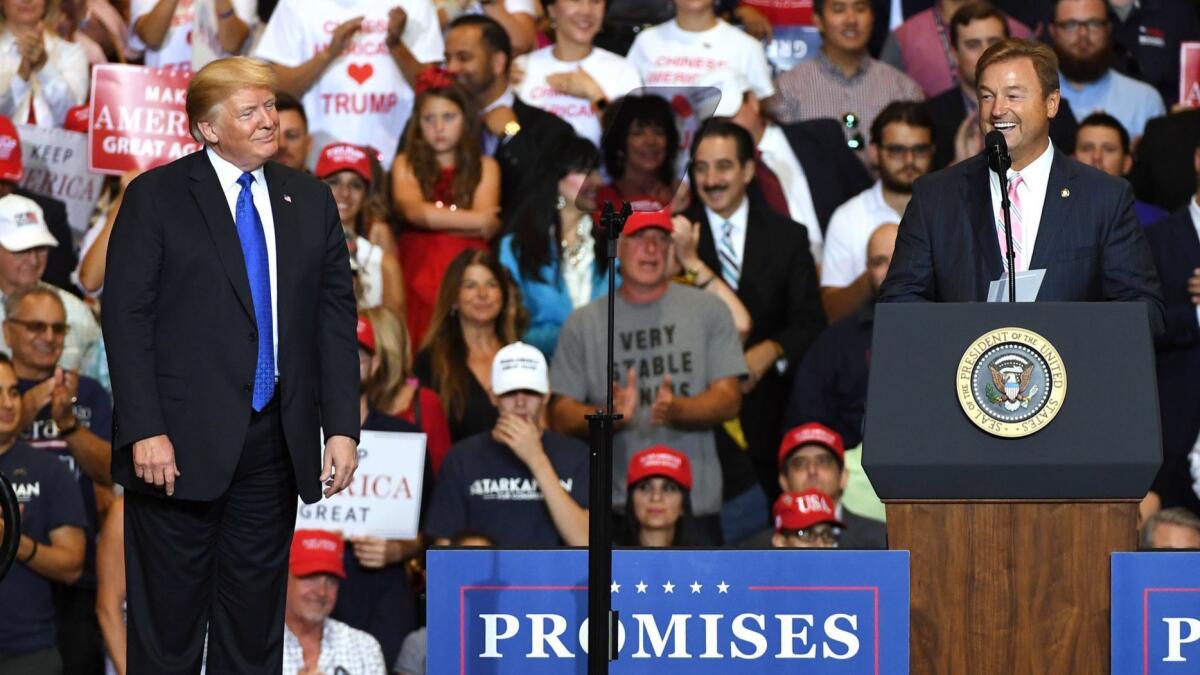Trump’s approval rating is in the dumps, even though the economy is soaring. One reason is Trump himself

Reporting from Reno, Nev. — When the Great Recession hit, it walloped Nevada like no other state, claiming Corry Castaneda among its many victims.
His work remodeling homes practically dried up — “the joke was we were all burning furniture to keep warm”— and there were times he and his wife and two kids were just a paycheck away from desperation.
Things changed dramatically as the economy roared back to life. There’s money in the bank now, Castaneda said, and his career, managing commercial real estate, is thriving as Reno and its neighbors experience a tech-driven boom.
But that’s no thanks, he says, to President Trump, or anyone else in Washington.
Trump boasts of presiding over the greatest economy in the history of America. Even allowing for his habitual exaggeration, the statistics are impressive: the lowest unemployment rate in nearly half a century, a sky-scraping stock market — even after the recent slide — buoyant levels of business and consumer confidence.
Yet the president’s approval rating is stuck in the dumps, hovering in the low 40% range, owing to the near-constant distractions he creates, the uneven benefits of his signature tax cut and voters like Castaneda who think Trump has very little, if anything, to do with their good fortunes.
The 47-year-old Libertarian credits retiring GOP Gov. Brian Sandoval and local business leaders for making the Reno area a post-recession magnet for Apple, Tesla and other job-producing engines. “Much of the Washington stuff doesn’t necessarily trickle down or translate to northern Nevada,” Castaneda said, pausing en route to the buffet at a recent Rotary Club lunch.
The disconnect between economic performance and political fallout is not wholly new. Strong growth, which hit a muscular 5.2% in the third quarter of 2014, was not enough to stave off electoral disaster for President Obama in that year’s midterm election, when Democrats lost the Senate.
Perhaps because then, as now, not everyone shared equally in the prosperity.
The tax cuts that Trump signed into law have been like rocket fuel for corporate profits and Wall Street investors. But Americans of lesser means have enjoyed considerably more modest benefits, which, by some calculations, have been largely offset by inflation, increased healthcare costs and higher gas prices.
Still, the gap between well-being and well-liked appears to be considerably greater than usual for this president. Indeed, repeated surveys show the robust economy is not a key driver this midterm election.
The reason, many suggest, is Trump himself.
“A huge part of this is he’s a big personality and being a big personality he’s made this a very personal referendum,” said Anita Dunn, a former Obama strategist. “He has, to some extent, separated himself from his policy achievements.”
John Sides, a George Washington University political scientist, was blunter still. “He can’t get out of his own way,” Sides said, citing the self-generated controversies surrounding Trump from the moment he launched his White House bid.
Crunching data — overlaying presidential popularity and the University of Michigan’s decades-long survey of consumer confidence — Sides calculates that Trump’s approval rating would be about 20% higher than it is today if not for his behavior, temperament and myriad scandals.
The difference is significant. In midterm elections going back to 1946, presidents with job approval ratings below 50% in Gallup surveys have seen their party lose an average of 37 House seats, compared with 14 when a president’s approval was above 50%. Democrats need to gain 23 seats to win control of the House on Nov. 6.
The economy’s cyclical. Things go up and down.
— Liza Maupin, a Reno Republican who scoffed at President Trump taking credit for the strong economy
Like so much else these days, perceptions of the economy are strongly colored by partisanship.
Republicans tend to have a much rosier view than Democrats — the reverse being true when Obama was president — though many who dislike Trump would doubtless do so no matter how low the unemployment rate or how high the stock market.
Democrats, surveys show, are particularly loath to attribute these good times to the president, or to anything he has accomplished.
“I’m not an economist but I know a lot of key metrics were already on the upswing at the end of Obama’s term,” said Tova McGilvray, 35, who works for a title company in Reno after holding down three jobs — court clerk, bartender and casino dancer — when Nevada’s economy began cratering in 2008.
“For Trump to swoop in and take credit is as ludicrous as saying Obama caused the recession when you’re talking about financial manipulations that happened under Bush,” she said of Obama’s Republican predecessor, George W. Bush.

But partisanship can’t entirely explain the disparity between the economy’s performance and evaluations of Trump.
A Wall Street Journal/NBC News poll found that nearly 7 in 10 voters surveyed in September expressed satisfaction with the economy and a plurality, 41%, said the president’s policies had helped. Still, nearly 6 in 10 said they wanted a change from the direction Trump was headed, including nearly a third of Republicans, suggesting the economy was hardly paramount in weighing their vote.
Liza Maupin, for one, believes that presidents have very little control over the economy, and Trump is no exception.
“I don’t think you can credit anyone personally. I know lots of people are taking credit,” the 55-year-old Republican said with a knowing laugh. “The economy’s cyclical. Things go up and down.”
For that reason, she’s focused on other issues, including immigration, human rights and which candidates she believes will best work across party lines. Maupin won’t be supporting Dean Heller, the state’s Republican senator, as he seeks a second term and ties himself closely — too closely for her taste — to the president.
“I’m no fan of Trump,” said Maupin, who recently retired from running a local charity. “I’ll just leave it at that.” (Trump lost Nevada to Hillary Clinton and though his approval rating is better here than in other states, it still stands below 50%.)

It is striking, given Nevada’s dramatic turnaround, that the economy hasn’t been an overriding issue in Heller’s reelection fight, the campaign to succeed Sandoval or a pair of competitive congressional races.
Unemployment peaked at 13.7% in 2010, the highest in the nation, and for a time Nevada also led the country in home foreclosures and personal bankruptcies. Today, unemployment is 4.5%, job growth is more than twice the national average and taxable retail sales have hit the highest level in state history, according to Applied Analysis, an economic forecasting and research firm.
But instead of talking up the state’s comeback, GOP candidates have focused mainly on tearing down their Democratic opponents.
Heller portrays Jacky Rosen, a Las Vegas congresswoman, as a cackling Hillary Clinton clone with nothing to show for her single term in Congress. Republican Rep. Cresent Hardy depicts Democrat Steven Horsford, his rival for a Las Vegas House seat, as a deadbeat who failed to pay his bills and had his driver’s license suspended for ignoring a traffic ticket.
“Not a lot of morning in America,” said former Nevada Republican Gov. Robert List, referring to the radiant TV spot that President Reagan ran amid the prosperity that ushered him to a second term.
Eric Herzik, a longtime student of Nevada politics, said candidates were smart not to place too much emphasis on the economy, since the state in some ways is still recovering from its years-long downturn.
Unemployment is still higher than the national 3.7% jobless rate. Home prices and median household incomes, while considerably higher, have still not reached their pre-recession levels.
“Most voters would say, yes, this is good but not ‘great,’ ‘tremendous’ or whatever superlative Trump uses on a given day,” said Herzik, who heads the political science department at the University of Nevada in Reno.
“Everybody’s happy the recession is over,” he went on. “Everybody would say the economy is very strong … but there are still a lot of people who don’t feel completely on their feet and that the economy is benefiting them personally.”
All of which make the U.S. Senate race and other Nevada contests too close to call just over three weeks to election day.
Twitter: @markzbarabak
More to Read
Get the L.A. Times Politics newsletter
Deeply reported insights into legislation, politics and policy from Sacramento, Washington and beyond. In your inbox three times per week.
You may occasionally receive promotional content from the Los Angeles Times.











